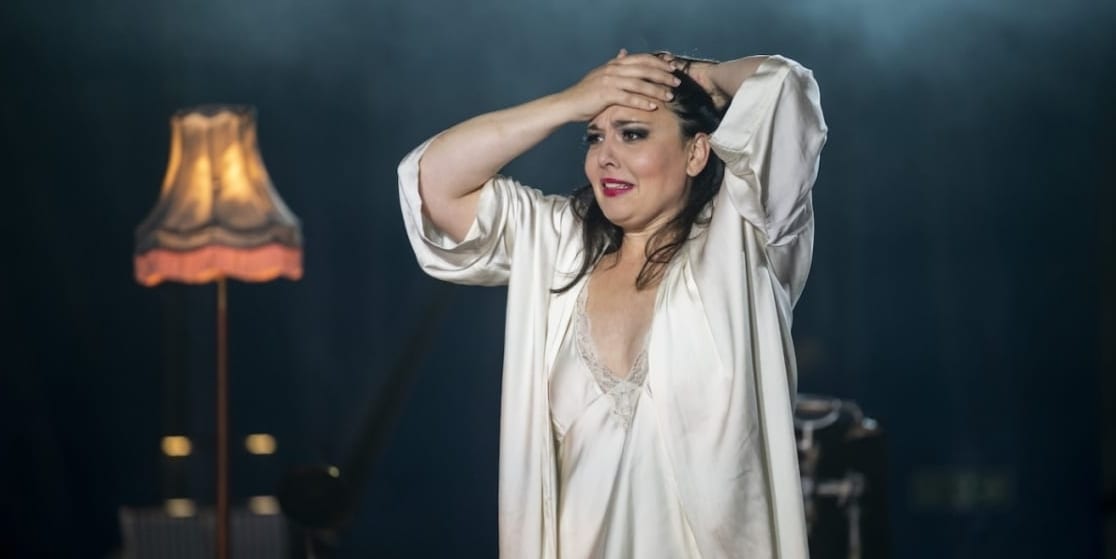This truly important production of the Monteverdi early (1641) opera Il Ritorno d’Ullise in Patria (Ulysses Returns Home) is a captivating piece of brilliant theatre, emotionally involving, dramatically satisfying, and intellectually thought-provoking. You come away feeling almost that this is always how Renaissance opera needs to be performed. Full praise especially, then, for the director, Polly Graham, for her concept and for welding a team of singing actors into a powerful ensemble. Every single one displays a total commitment to and spellbinding understanding of their characters and of the musical idiom through which they are expressing a gamut of human emotions from the vilest to the most enlightened, whether as gods, heroes, or venal suitors. There is not one weak link in this cast and everyone contributes fully to the evening both musically and dramatically.
An especially memorable performance is delivered by Tom Randle as a gruff, sensitive, brilliant, heroic, and sly Ulisse, matched perfectly by Lucia Cervoni as the virtuous, intensely troubled, and strong Penelope. Randle is vocally powerful, effulgent yet able to scale back movingly for sensitive moments. He is a memorable exemplar of this role both dramatically and visually. His brooding controlled anger and frustration are imminent from his first entrance. He believably embodies the exhaustion and the violence of his war experiences and of his wanderings. He conveys both the heroic and flawed characteristics of Homer’s Ulysses throughout, even when he is simply sitting still. (This production now compels me to read the highly-praised 2017 translation of The Odyssey by Emily Wilson.) The updating of the opera to some unknown, current war – Afghanistan? Serbia? Yemen? – is handled with complete unselfconscious naturalness, enhanced by the design of April Dalton.
On the night I attended, Randle was also heroic in person. Someone in the audience collapsed just at the end and when Randle realised what was happening he rushed from the stage and assisted. Once the audience member was revived and taken for proper care, and once we all knew that he was not seriously ill, Randle resumed his place on the stage and was, immediately, Ulysses again – having just killed his evil rivals and now desperate to convince a skeptical Penelope that he was truly her long lost husband.
As Penelope, Canadian mezzo Lucia Cervoni gave a compelling, indelible performance both vocally and emotionally. I would love to hear Cervoni in many other roles, her voice is so strong, rich and lovely. I want to hear her Handel or Mozart, her Verdi, maybe one day her Wagner or Strauss. There is something honey-like about her timbre and also her delivery is continuously expressive.
As for the other players, I would have to name check and praise every single one to do them justice – Andrew Irwin’s Telemaco, Llio Evans’s Melanto, Oliver Brignall’s Iro, Claire Wilde as Minerva, Rosie Lomas as Giunone, etc, etc — so let me just iterate firmly that there is not one weak link among them. And they were all especially responsive to the portrayals of their individual characters.
The setting and mood are war-torn grunge at the end of a non-specific war – and this somehow works. I was reminded throughout of German expressionism and the influence of Brecht’s theory of the Alienation Effect. This production does us a special service because it shows how an opera that many people consider to be arcane, in an idiom that plenty of people find un-relatable, can be turned into a piece of modern, mesmerising theatre with a sense of total modern relevance, emotionally and even politically.
And importantly, the group of five musicians called La Serenissima led by Robert Howarth understands fully and recreates for us the musical idiom and true originality of Monteverdi.
This was is one of the best sung, best acted, and best played versions of this historically important opera that I have ever experienced, and the fact that it was performed in a circus tent in the round by socially distanced performers working before a social distance audience somehow made it all the more exciting, pulling us into the action and the psychology of the characters throughout.

